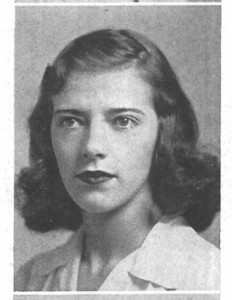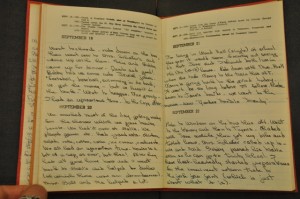Ann T. Winchester was not looking forward to returning to school on September 28, 1943. She has written “Doom Day!” next to that date. Her entry continues:
Fooled around all morning getting ready for the great trek back to Storrs. We started at 2:00. [T]ook Jane and Mrs. Schafer – she gave me a beautiful blue cardigan and a white wool kerchief. We found my room in Wood – small but a single.
“Wood” in this case refers to UConn’s very own Wood Hall, which currently houses the History Department. Ann, a resident of Windsor and student at the University of Connecticut from 1941 to 1945, had lived in Holcomb Hall on East Campus during the Spring of 1943, but moved into Wood Hall for the 1943 – 1944 school year.
Ann was a student at the University of Connecticut during World War II when the ratio of male to female students on campus was at its lowest (nearly 1:1) since the University’s inception, due in part to the significant numbers of young men fighting in Europe and the Pacific. Notably, she was also one of the first students to graduate from the University of Connecticut’s School of Nursing, which accepted its first class in September of 1942.  She was a member of the Nursing Club, worked in the infirmary, and participated in an in-residence nursing training program at Backus Hospital in Norwich during the summer of 1943.
She was a member of the Nursing Club, worked in the infirmary, and participated in an in-residence nursing training program at Backus Hospital in Norwich during the summer of 1943.
I once heard a writing professor define a diary as “a place to record the highs and lows of the day.” Ann’s diary, a series of short entries written daily from January 1, 1943 through December 31, provides consistent insight into the highs and lows of each of her days. A typical entry reads as follows:
May 7, 1943: After physics this a.m. – I went out on the roof for a couple hours of sunbathing. Hot and muggy today. Looked like Coney Island out there. Fooled around the rest of the day except for going to nursing class. Tonite we painted quite a bit. Then we took a walk up to the restaurant up the road and had coffee and doughnuts and smoked. Was fun – the nite is swell – warm and smells good. The peepers were singing for all they were worth.
In this way, each daily entry can read as a stand-alone record of one day’s events. But when read in its entirety, we start to see that Ann’s journal became a place where she recorded continuity and changes in her life over days, weeks, years, and semesters. Take, for example, the following excerpts from entries Ann writes over the course of three days in the Spring of 1943 about “an escapade,” which seems to have involved co-authoring a controversial note about one of her fellow house-mates (Flavia) with her roommate, Jane (May 4). This got her into particular trouble with a “Mrs. Davis,” presumably the house mother in Holcomb Hall, where she was living at the time:
April 28: Tonight Jane and I went to the House Council Meeting not expecting too much bad. Mrs. Davis gave us hell and threatened us with suspension. Not only the note was brought up – but working on shreds of truth, she told wholesale lies about us – “we’re vulgar.” Forbade Flavia to associate with us. Mrs. Davis is absolutely low and treacherous. In short she nauseates me!!!!
April 29 – I wrote mother about last nite – hope she’ll stand up for me! This place is stifling me – the petty minds and the cats that abound…Now Davis says [Flavia] can eat with us, but not come into the room. We’d corrupt her. I’ll get even with Davis some day!
And finally:
May 1: Both [Jane and I] went down to see Mrs. Davis this aft – she was too sweet to us. Well, maybe she thinks a little better of us. But you never can tell. To bed early.
These successive entries indicate that this issue remained a feature of Ann’s life over the course of several days.  By reading each of these entries, then, we see that Ann used her journal to record her changing thoughts on the consistent features in her life, and perhaps gain insight into the relative importance of each of these concerns to her. Certain topics, including her relationships, class work, habits, and career goals, seem to be of greatest concern to Ann because she writes about them at length. Some aspects of her life – such as her ongoing battle with her physics and chemistry classes – are easy to recognize as important to her because she writes about them explicitly and frequently.
By reading each of these entries, then, we see that Ann used her journal to record her changing thoughts on the consistent features in her life, and perhaps gain insight into the relative importance of each of these concerns to her. Certain topics, including her relationships, class work, habits, and career goals, seem to be of greatest concern to Ann because she writes about them at length. Some aspects of her life – such as her ongoing battle with her physics and chemistry classes – are easy to recognize as important to her because she writes about them explicitly and frequently.
But there are other continuities, such as her on-going friendship with her roommate Jane, which we know are important to her, even if she doesn’t say so explicitly. Ann never writes, “Jane is an important part of my life.” We simply know this, because she mentions her nearly every day. Their friendship is so pervasive that as I read her journal, any time Ann used the pronoun “we,” I automatically began to assume it meant “Jane and me” – even if this wasn’t always the case. More ambiguous is the relative importance of the War to Ann’s life, which we recognize only through passing references to rationing, war-time movies, blackouts, and a visit by Mrs. Roosevelt to campus in March of 1943.
Long-term change, as well as short term change, is also a feature of Ann’s diary. During her summer (June – August 1943) spent as an in-residence nursing student at Backus Hospital, Ann befriends a “Miss Classé,” an instructor at Backus. Taken with her, Ann writes, “She looks like the perfect nurse. I’ll have to pattern myself after her” (July 16). Later, in October, when she attends a Nursing Club lecture given by an ex-Navy nurse, she confides to her journal that, “I rather think I would like to be a navy nurse” (October 25). In this way, Ann uses her diary to anticipate and project her present life into her future, particularly as it relates to her career – unsurprising for a young person in school.
Rebecca D’Angelo is a senior undergraduate student in History and Anthropology. In her blog series For Private Eyes Only she will study various diaries available in Archives and Special Collections at the Dodd Research Center to explore the history of journal writing and reasons why we write journals.
